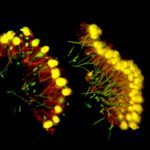Link to Pubmed [PMID] – 26407212
Link to DOI – 10.1146/annurev-cellbio-102314-112441
Annu Rev Cell Dev Biol 2015 ; 31(): 373-97
Mechanotransduction translates mechanical signals into biochemical signals. It is based on the soft-matter properties of biomolecules or membranes that deform in response to mechanical loads to trigger activation of biochemical reactions. The study of mechanotransductive processes in cell-structure organization has been initiated in vitro in many biological contexts, such as examining cells’ response to substrate rigidity increases associated with tumor fibrosis and to blood flow pressure. In vivo, the study of mechanotransduction in regulating physiological processes has focused primarily on the context of embryogenesis, with an increasing number of examples demonstrating its importance for both differentiation and morphogenesis. The conservation across species of mechanical induction in early embryonic patterning now suggests that major animal transitions, such as mesoderm emergence, may have been based on mechanotransduction pathways. In adult animal tissues, permanent stiffness and tissue growth pressure contribute to tumorigenesis and appear to reactivate such conserved embryonic mechanosensitive pathways.

